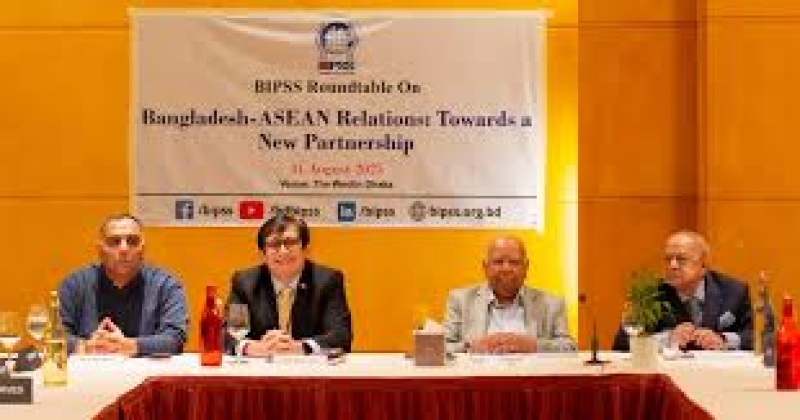- Xi unveils vision for equitable global governance, rejects unilateralism |
- EU Warns Xi-Putin-Kim Alliance a Challenge to World Order |
- Matarbari Project Set to Create 2.5m Jobs, Boost Economy |
- 4,000 ASIs to Be Recruited Ahead of Polls, Says IGP |
- World Heritage Sites Face Rising Water Risks from Climate Change |
Sectoral partnership offers Bangladesh key pathway: ASEAN

Discussants at a roundtable have underscored that while ASEAN membership may not be immediately feasible, the sectoral dialogue partnership offers Bangladesh a ‘realistic and impactful pathway’ for engagement.
The panelists and participants agreed that the future of Bangladesh-ASEAN relations must be guided by mutual trust, practical cooperation and people-centered initiatives.
Moderating the discussion, Bangladesh Institute of Peace and Security Studies (BIPSS) President Major General (retd) ANM Muniruzzaman observed that Bangladesh should prioritise cooperation with ASEAN in areas such as climate resilience, disaster preparedness, and AI governance—emerging issues that will define the future of regional cooperation.
The BIPSS hosted the session on ‘Bangladesh–ASEAN Relations: Towards a New Partnership’ at a city hotel on Sunday.
Former Foreign Affairs Adviser and Distinguished Fellow at BIPSS Dr Iftekhar Ahmed Chowdhury, Chargé d’Affaires at Singapore High Commission in Dhaka Mitchel Lee and Senior Research Fellow at BIPSS and Head of BCTR Shafqat Munir joined as panelists.
The event brought together diplomats, academics, experts and development practitioners to explore pathways for strengthening Bangladesh’s engagement with ASEAN.
Dr Iftekhar cautioned that ASEAN membership may remain elusive in the near future due to economic disparities and political complexities.
He acknowledged two fundamental constraints to full membership: geography and identity. “ASEAN remains, by definition, a Southeast Asian grouping with its own socio-cultural and geographic coherence, and Bangladesh falls outside these parameters.”
Bangladesh’s Strategic Future
Dr Iftekhar provided a conceptual framework on the evolving international system and stressed the importance of external linkages like ASEAN for Bangladesh’s strategic future.
“These include strengthening its Sectoral Dialogue Partnership, pursuing bilateral free trade agreements with key ASEAN members, and undertaking robust domestic reforms to enhance competitiveness,” he said.
Dr Iftekhar said Bangladesh’s external engagement with ASEAN should be understood not only as an economic imperative but also as a strategic necessity dictated by the realities of the evolving global order.
Closer Engagement
Mitchel Lee highlighted ASEAN’s growing role as a hub of economic integration, connectivity, and regional stability, noting initiatives such as the Digital Economy Framework Agreement, the ASEAN Power Grid and upgraded free trade agreements with major partners.
He emphasised that Bangladesh could benefit from closer engagement in economic, digital and energy cooperation, while also exploring labor mobility opportunities.
The diplomat said ASEAN’s strategic relevance lies in its large, young and rapidly growing consumer base, strong economic growth, and constructive role in promoting peace and regional stability.
He said recent developments, including strengthened ASEAN-plus-1 FTAs, the ASEAN Digital Economic Framework, and the ASEAN Power Grid initiative, provide platforms for Bangladesh to secure economic and strategic gains. By leveraging these opportunities, Bangladesh can enhance market access, attract investment, and strengthen its regional linkages without full membership.
Muniruzzaman emphasised that the Bangladesh–ASEAN relationship is rooted in cultural proximity and a shared aspiration for peace, prosperity and stability.
He noted that as Bangladesh prepares to graduate from LDC status, forging closer ties with ASEAN is not just desirable but a strategic necessity for the country’s future trajectory.
Muniruzzaman highlighted that the partnership between Bangladesh and ASEAN must be recalibrated in the context of today’s shifting global economic currents, climate challenges, and evolving security dynamics, and should be forged around four core pillars: economic collaboration, enhanced connectivity, energy and climate resilience and strategic cooperation.
Strategic and Security Dimension
Shafqat Munir underlined the strategic and security dimension of ASEAN–Bangladesh ties and pointed to areas such as counterterrorism, organized crime, maritime security, cyber defense, humanitarian assistance, and peacekeeping cooperation as key avenues for deeper collaboration.
He stressed that Bangladesh’s geographic position as a bridge between South and Southeast Asia makes it a natural partner for ASEAN in ensuring regional stability and connectivity.
The discussion also emphasised that Bangladesh, as a member of the ASEAN Regional Forum (ARF) since 2006, has an important role to play in advancing regional security cooperation.
The ARF, which serves as the region’s key platform for political and security dialogue, focuses on maritime security, counter-terrorism, cyber resilience, non-proliferation and disaster relief.
Deeper engagement with ARF would allow Bangladesh to share its experience in border security, preventive diplomacy, and disaster management, and project itself as a constructive and stabilising actor in regional politics.
Shafqat Munir proposed that the newly elected government should initiate the ‘Look-East 2.0’ strategy to enhance defense cooperation with ASEAN militaries.
At the same time, he stressed the value of closer cooperation with the ASEAN Coordinating Centre for Humanitarian Assistance (AHA Centre).
Strengthening collaboration with the AHA Centre could allow Bangladesh to harmonize early-warning systems, enhance cyclone preparedness, coordinate disaster relief logistics, and align humanitarian standards in refugee management, including repatriation readiness for the Rohingya, Shafqat Munir said.
He said such collaboration would not only improve regional humanitarian responses but also reinforce ASEAN’s role as a trusted partner in addressing shared human security challenges.
The session also featured a Q&A session with participants including diplomats, academics, youth representatives and civil society members.
The issues raised ranged from climate finance and resilience—where participants urged stronger Bangladesh–ASEAN collaboration to access global resources and push for more effective regional advocacy—to knowledge-sharing and R&D partnerships, particularly in technology, artificial intelligence, and green innovation.
Participants emphasised that climate finance remains a critical challenge for both Bangladesh and ASEAN members, as many countries in the Global South continue to face barriers in accessing funds for adaptation and resilience.
The discussions also touched on labor mobility, with a focus on how Bangladesh can expand skilled manpower exports to ASEAN economies while addressing host country sensitivities, as well as on people-to-people ties, emphasizing the importance of youth exchanges, education, tourism and cultural cooperation, reports UNB.

